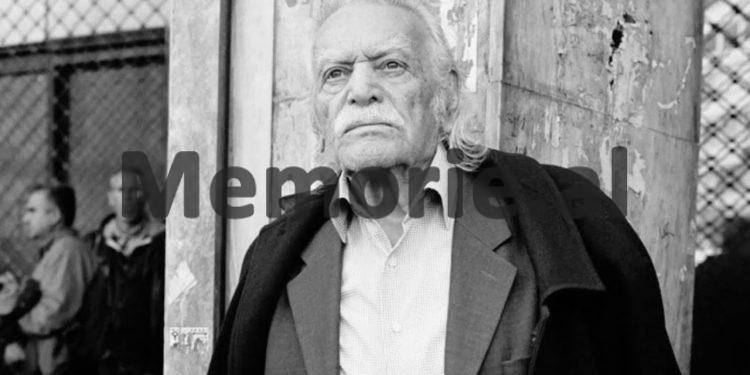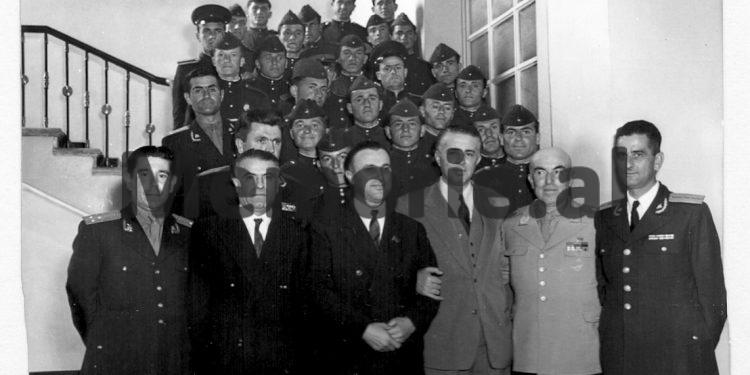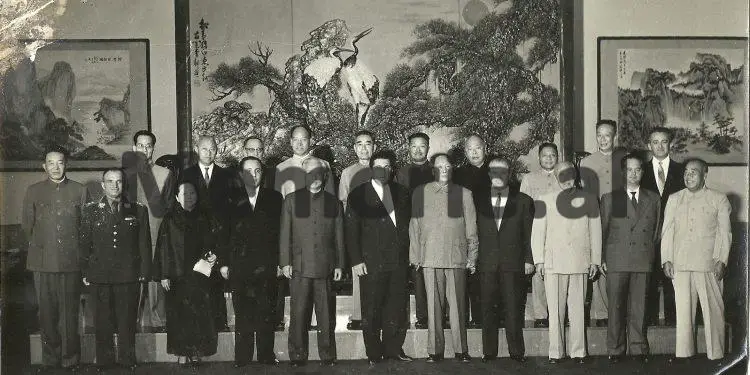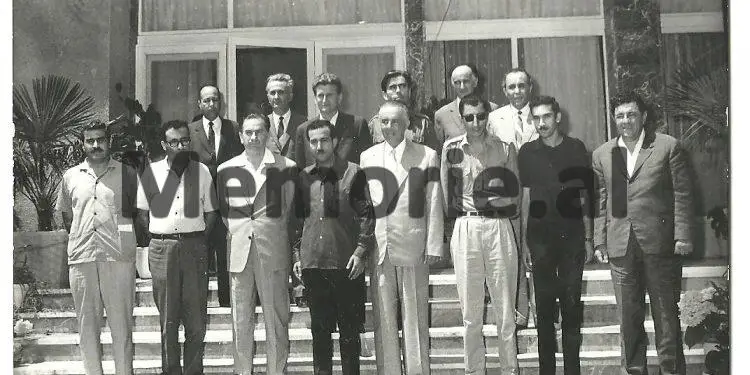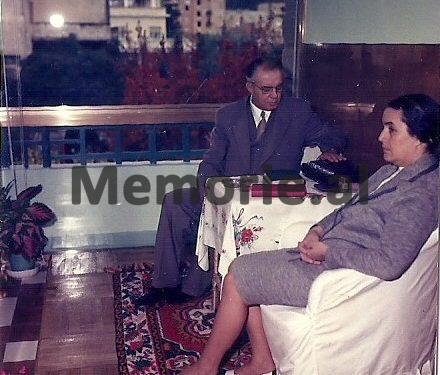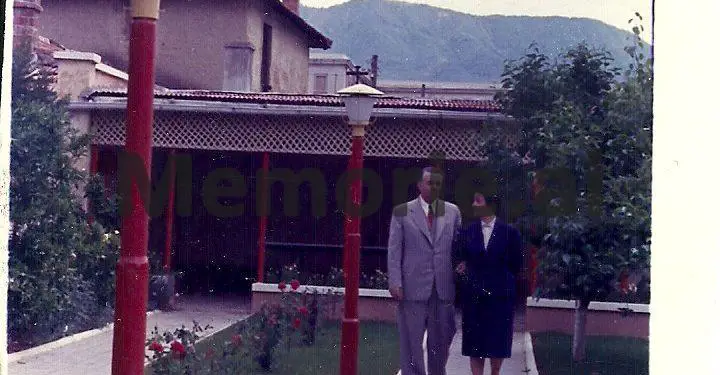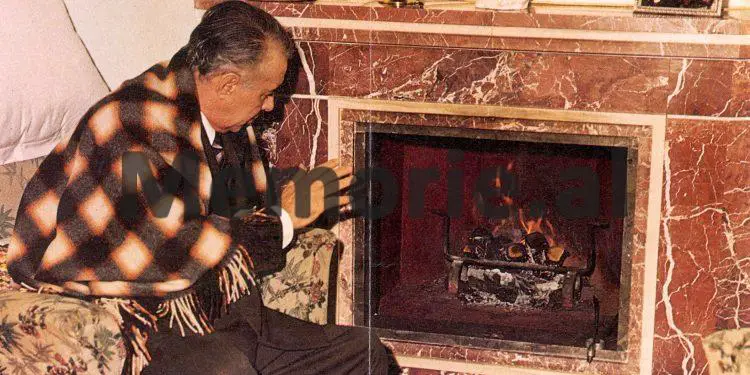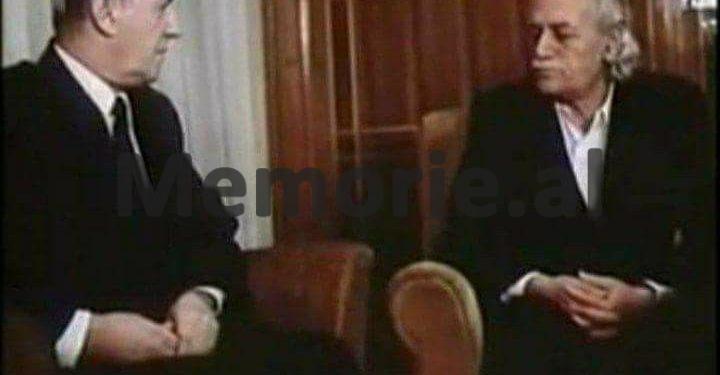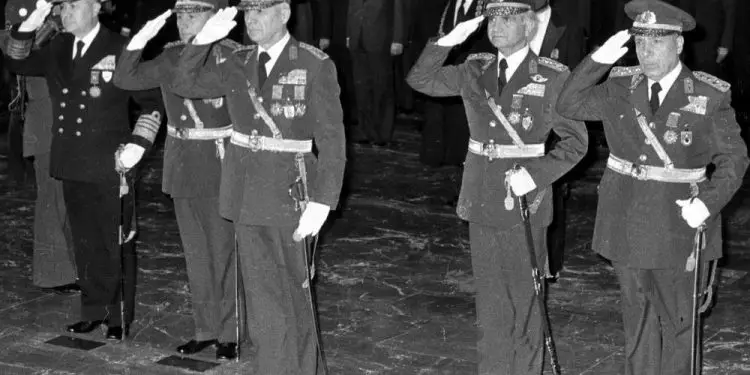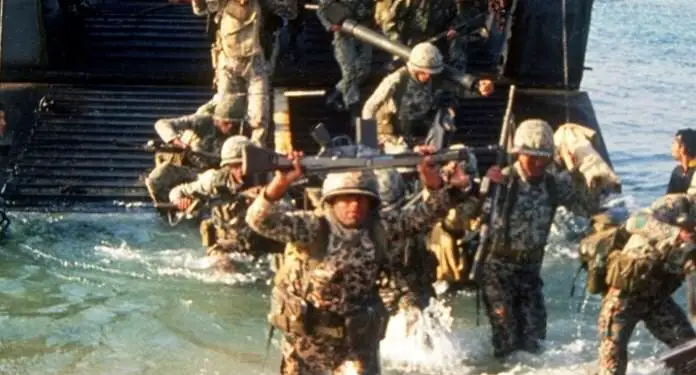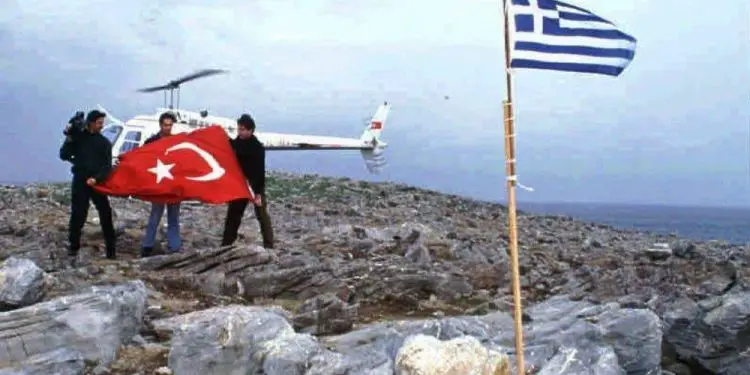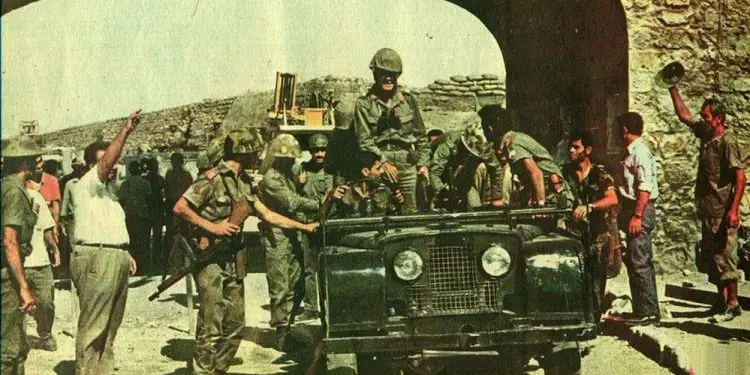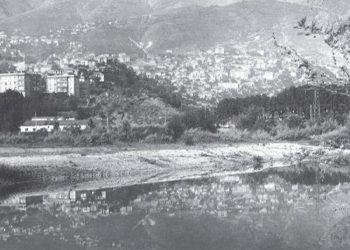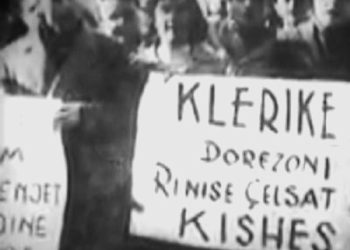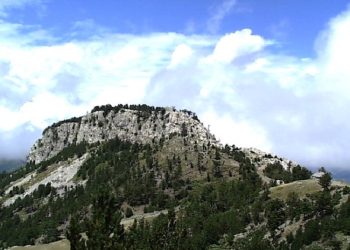Dashnor Kaloçi
Memorie.al publishes some archival documents extracted from the Central State Archive in Tirana (fund of the former Central Committee of the ALP) where Enver Hoxha’s diary is located, where, among other things, he has kept notes and made analyzes commenting. during all the events that took place between Greece and Turkey due to the conflicts that took place on the island of Cyprus populated by two respective ethnicities, (Turkish Cypriots and Greek Cypriots) from 1963 – ’64. How did the communist leader Enver Hoxha describe the events that took place from the conflict on the Mediterranean island, his and Tirana’s official position regarding those events, for which he blamed and blamed official Moscow and Washington. As well as his fear of an eventual military intervention in Albania, which seems to have forced Enver Hoxha to keep the army in combat readiness and to give the relevant orders to the highest chiefs of the Ministry of People’s Defense.
“The monarcho-fascist dictatorship was restored in Greece. The power of the fascist generals, led by King Glücksburg and American imperialism, is restoring terror in Greece, filling the terrible island camps, where communists and ELAS soldiers were tortured and killed for years, and of the Greek Democratic Army. The Greek fascists seized power because the toy of “democratic” elections endangered the monarchy and the immediate interests of American imperialism.
The latter makes the law in Greece and has turned this into its main base in the Mediterranean, from where it oversees and supports its diversionary actions and threatens all the peoples of the Mediterranean basin who disobey it. Greece for the United States of America is the belly of Europe and they have gripped Greece from b… and spin it wherever they want. Even the American allies in NATO, such as Turkey, Italy, etc., are not at all satisfied with what is happening in Greece, because the Greek monarcho-fascist chauvinists will throw megaloid ideas against both Turkey (Cyprus) and against the influence. Italian in the Mediterranean”. This is what the communist leader Enver Hoxha wrote, among other things, in his diary of March 10, 1964, about the riots that started on the island of Cyprus in the Mediterranean, between the two ethnicities, Greeks and Turks, who were populating the country that had declared independence from The British Commonwealth, establishing its Republic with the President, the Greek Archbishop Makarios III, which had come after an agreement between London, Athens, Ankara, and Nicosia, was signed in the same year in Zurich and London.
How did the conflict on the island between the two ethnicities start?
But before we see what Enver Hoxha has written in his diary, which among other things came about the fact that communist Albania had established diplomatic relations with the Turkish Republic in 1957, while 14 years later, in 1971, Tirana officially established diplomatic relations with the Greek state, we are doing a retrospective of the development of events on the island of Cyprus. Thus, while inter-ethnic violence between the two main constituent communities of the island, Turkish Cypriot and Greek Cypriot, had begun as early as 1963-’64, the British military forces that had administered the island until the day of the declaration of independence, were in retreat and they were forced to call for help from the UN Blue Helmets. Meanwhile inter-ethnic fighting on the island would continue for a long time and it would become increasingly fierce in the 1965s-’70s, until the Turkish population was forced to isolate itself in a giant enclave in the northern part of the island, opposite its southern part. which was dominated by the Greek troops of President Makarios. Meanwhile, in this period of events, in the 60s, Greece and Turkey would be involved in two coups, which would bring to power the colonels’ junta, respectively in Turkey in 1960 with leader Cemal Gursel, and in Greece in 1967, with Georgios Papadopoulos. Official Tirana opposes the coups as “American-instigated”, but did not sever diplomatic relations. In the 1970s, two more coups took place in these countries. Thus, in 1971, in Turkey, Gursel was overthrown by the civil government of Bulent Ecev, while in Greece, in 1973, Papadopoulos was replaced by Dimitrios Ioannides. During this time, tensions in Cyprus culminated in fierce armed clashes between the two ethnic groups, who wanted to keep the island united with the respective states. In 1974, a coup took place in Cyprus, where the liberal Archbishop Makarios was to be forcibly replaced by the nationalist Nikos Sampson. Nicosia, declared “Enosis” (Official Union with Greece). Meanwhile, official Ankara is alarmed, where Ecevit orders the army to stay on alert for any surprises in the situation on the island. After that, on July 20, 1974, the Turkish military forces undertook Operation “Attila”, otherwise known as the Turkish occupation of the northern part of the island. (The northern part of the island is divided by a wall similar to that of Berlin). While these events were taking place (which we will also see from Enver Hoxha’s notes in his diaries), official Tirana is alarmed, fearing an American intervention in the armed conflict in the eastern Mediterranean.
Likewise at this time, Turkish and Greek military forces reach the brink of armed conflict over the disputed area of the Eastern Aegean, the islands and oil-bearing areas between Athens and Ankara. Hoxha tries to play an official loyal policy between the two countries as long as there is no “American intervention” in the Balkan and Eastern Mediterranean basin. Despite ongoing efforts by governments and various organizations around the world (including after 1990 and Albania), the problem of the division of Cyprus and the disputed Aegean oil-bearing islands and territories between Turkey and Greece still seems unresolved. which the events of the last days show the lesson.
Continues from the last number
Enver Hoxha’s diary with notes on the Greek-Turkish conflict
TUESDAY
JULY 23, 1974
CYPRUS AND THE HEGEMONIST PLANS OF THE TWO SUPERPOWERS IN THE EASTERN MEDITERRANEAN
The article we sent today to the newspaper “Zeri i Popullit” and which will be published in its tomorrow’s issue, aims to expose the plans of the two imperialist superpowers of the United States of America and the Soviet Union in the Mediterranean. The article is entitled: “Cyprus and the hegemonic plans of the two superpowers in the Eastern Mediterranean.”
SATURDAY
10 AUGUST 1974
Note
I told my comrades that, through the employees of our Ministry of Foreign Affairs, the Greek government should be informed that in the case of the recent situation in Greece, regarding the Cyprus crisis, Greece should be calm. and safe from the borders it has with our country. This attitude of ours is politically correct and will have an effect on the neighboring country.
TUESDAY
FEBRUARY 25, 1975
US AND SOVIET IMPERIALISM PREPARES WORLD THIRD WAR, BUT ALSO AFRAID OF IT
What is happening in the Mediterranean? Same thing. Athens colonels staged a CIA-driven coup in Cyprus. Both they and the Americans failed. The Soviet Union “protected” Cyprus and “encouraged” Turkey. It attacked Cyprus and settled there, Greece was angry about it, but had nothing to do. She threatened NATO and left “halfway through it.” The United States got angry with Greece, Russia left Turkey and turned its face away with a cynical smile from Greece. The United States Senate, fearing that Russia was invading Greece, decided to cut off arms supplies to Turkey. “I will give you a weapon,” he told the Russian. However, since the United States was endangered in both pictures, they recently organized a new “small” coup with the CIA as a warning against Karamanlis and in favor of Papadopoulos.
This coup failed, but others must be expected to come after, because neither in Turkey, nor in Greece, nor in Bulgaria, nor in Romania, nor in Yugoslavia, there is no peace, there is no stability. All these countries are ruled by two savages armed to the teeth, who in their blood have nothing but predatory war, intrigue, oppression, aggression. The world is boiling over a volcano and only the determined resistance of the peoples saves humanity from these two pitfalls and from these intrigues.
WEDNESDAY
JULY 2, 1975
THE BALKANS, THE SUPER POWERS, CHINA AND US
Let’s take Greece. All the while it has lived under English, French and American rule. Now it looks like it is independent. This is not true. Greece gives the impression of a “multi-party bourgeois democracy”, of a constitutional republic. It is in anti-Turkish positions, why Turkey attacked Cyprus, which the Greeks previously wanted to put under their gun. The Turks have lost their appetite and are threatening to invade the Dodecanese.
Karamanlis’s Greece, in order to stay in power, relying on Greek pseudo-democratic chauvinism, removed one foot from NATO to put pressure on the United States, which has imposed some embargo on the weapons it gives to Turkey. The situation, then, goes like this: The Soviets smile at both Greece and Turkey. He has recently given a $ 700 million loan to this, and sent statements and smiles to Karamanlis through Zivko, who triumphantly received the Greek Prime Minister in Sofia. Zhivko “promised him centuries-old friendship”.
Both sides agreed that there is neither Macedonia nor the Macedonian people. Zhivko tried to get port concessions in Alexandroupolis in Thrace, but failed. Karamanlis did not go to Bulgaria to sell his “homeland”, but to create the impression to Turkey that Greece has close friendships with Yugoslavia, Bulgaria, Romania, but also Albania. Greece, be it that of George, Constantine, Venizelos, Metaxas, Pavlos, the colonels and Papadopoulos, as well as others like those who are and can come to power, has been and is for the annexation of Albania. The South they call “Northern Epirus”.
Dreams are dreams, but the great Greek chauvinism seeks to make them a reality, tries, fights and never gives up eventual aggressive action. But even we do not give up protection and vigilance. The Greek colonels agreed to establish diplomatic relations with us. Karamanlis continued them and we continue them, because our interest loves us. But we do not sleep. We trade with the Greeks, we take from any step- in cultural exchanges, which is also in our interest.
But fool we are not to do as Chu En Lai says. He teaches us how to do it, but on the part of China, which is a great state, we do not see. to take no step towards India. But why not? Why India is pro-Soviet. Who are Yugoslavia, Romania, Greece, Bulgaria with, in what cage do they eat and in what bed do they sleep? No, Chu En Lai’s advice and thoughts on the policy he preaches for the Balkans are wrong, anti-Marxist, anti-socialist. We do not accept such a policy and we will continue in our right policy, we will make it seem that our policy has nothing to do with this revisionist-reactionary policy.
SATURDAY
8 NOVEMBER 1975
NEVER FORGET THE DANGER OF NEIGHBOR ENEMIES
Greece is removed as it pleases and practices with us a good neighborhood, but this is a bluff. As in the time of the colonels, even now the so-called northern Epirotes are parading and in front of President Cacos, ministers Averof, Ralis and others are shouting in the streets, squares, on radio and television about “their Northern Epirus”, about Korça and for their “Gjirokastra”. We, of course, protested, gave an answer to the Greek jackals. The Greeks failed in Cyprus and, to cover up this defeat, they have released dogs against us, but we break their teeth. Therefore the people and the Party should never have even the thread of the illusion that the wolf becomes a sheep. We have to keep the gunpowder dry and turn the rifle into a cannon.
SATURDAY
MARCH 4, 1978
EVERY COUNTRY HAS THE RIGHT TO PROTECT ITS OWN SOVEREIGNTY
The conflict between Egypt and Cyprus over the deployment of an Egyptian air commando to the country continues. Egypt has severed ties with Cyprus. Which of these two states is to blame in the middle? Of course, Egypt is to blame. I find a moderation in the attitudes of Cyprus and Kyprianos and an understanding on their part. They want diplomatic relations to be established between the island of Cyprus and Egypt and a state of peace to exist. But my opinion is that despite the moderation in the attitudes of the Cypriots, who have taken many steps for reconciliation with the Egyptian government, this, in turn, makes no mistake in this regard. There is no doubt that this government is being pushed by imperialist powers to keep the conflict, which was not caused by Cyprus, burning.
The Cypriots did their duty, fought for the protection of the country’s sovereignty. Why did the plane sent by Sadat, filled with a commando of soldiers, land without permission in Cyprus and forcefully attack a plane, which had inside it two Palestinian “terrorists” who killed the editor of the newspaper “Al Ahram”? Such an issue could not be resolved and it was impermissible to resolve it the way Sadat sought to resolve it.
“Recently, he has declared that he will protect the lives of every Egyptian with a weapon, in all four corners of the world!” How great are the claims of this kind of man! It would be better for him to think and prepare to liberate the territories occupied by Israel, to think about how to help his Palestinian brothers to regain their hated homeland, than to make such statements that he would protect even the most recent Egyptian person, found in a lost corner of the world.
POGRADEC, THURSDAY
JULY 19, 1979
CHRONICLE OF THE EVENTS OF THESE DAYS AND WHAT CONCLUSIONS WE CAN DRAW FROM THEM
The oil crisis and its impact on the world
Turkey wants to split the continental shelf of the Aegean, while Greece does not accept a shell other than the one that has been set so far. Incidents occur on the Greek-Turkish border. Turkey also wants to have its rule in the air, in the area over the Aegean Sea, if not completely, but at least this should be shared or agreed so that the planes of both sides can move freely. The opposition here is constant, except for the opposition to the Cyprus problem.
Currently, since Greece joins the southwestern side of NATO, the Americans try to make the commander of this wing neither Turkish nor Greek, but to be American, and the deputy commanders to be one Turkish and one Greek, in other words, these t ‘they hang their livers on the neck of the American wolf. Both Turkey and Greece are in crisis and need the United States. Especially in Turkey the situation is very honorable; there are big quarrels between Ecevit and Demirel’s party and here is the American hand that plays its game, as well as the Soviet hand, which makes great efforts to support Demirel, but this is very careful as towards the Americans, as well as to the Soviets.
However, the policy of Turkey as well as that of Greece is a dependent and very delicate policy. Therefore, there is a possibility of further aggravation of the contradictions between them2 and we must be careful because the aggravation of the situation between these two countries can lead to a weakening of the Greek-Bulgarian and Yugoslav-Bulgarian border./Memorie.al






